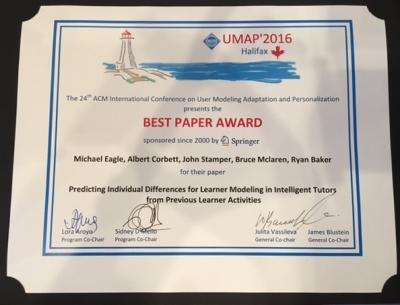HCII Takes Home Best Paper Award at UMAP 2016

Can past learning activities predict differences in individual student success? A recent project with researchers from the Human-Computer Interaction Institute (HCII) set out to answer just that, and picked up a Best Paper award along the way.
First authored by postdoctoral fellow Michael Eagle, the paper "Predicating Individual Differences for Learner Modeling in Intelligent Tutors from Previous Learner Activities" was awarded Best Paper during the User Modeling Adaption and Personalization (UMAP 2016) conference.
Along with Eagle, the paper was co-authored by Associate Professor Emeritus Albert Corbett, Assistant Professor John Stamper, Associate Research Professor Bruce McLaren as well as HCII Ph.D. graduate Ryan Baker, HCII Technological Specialist Angela Wagner, Research Programmer Ben MacLaren and Biology Professor Aaron Mitchell.
The paper analyzed results from a study funded by an NSF REAL project, "Knowing What Students Know: Using Educational Data Mining to Predict Robust STEM Learning," for which McLaren is the principal investigator (PI.)
The study originally used data from only intelligent tutoring activities to predict individual student differences in learning. However, the team found that predictive models incorporating a wider set of data provided a more accurate prediction. They added data extracted from prior reading and pretests, as well as tutor activities, to build a predictive model that outperformed a standard Bayesian Knowledge Tracing model and a model with best-fitting individualized parameter estimates.
"The predicted individual differences result in a better model fit, and cause significant changes to the amount of recommended practice," explained Eagle. "This is important as it saves time for students who need less practice, while also ensuring that sufficient practice is given to students who need more.“
See more Human-Computer Interaction Institute news.

